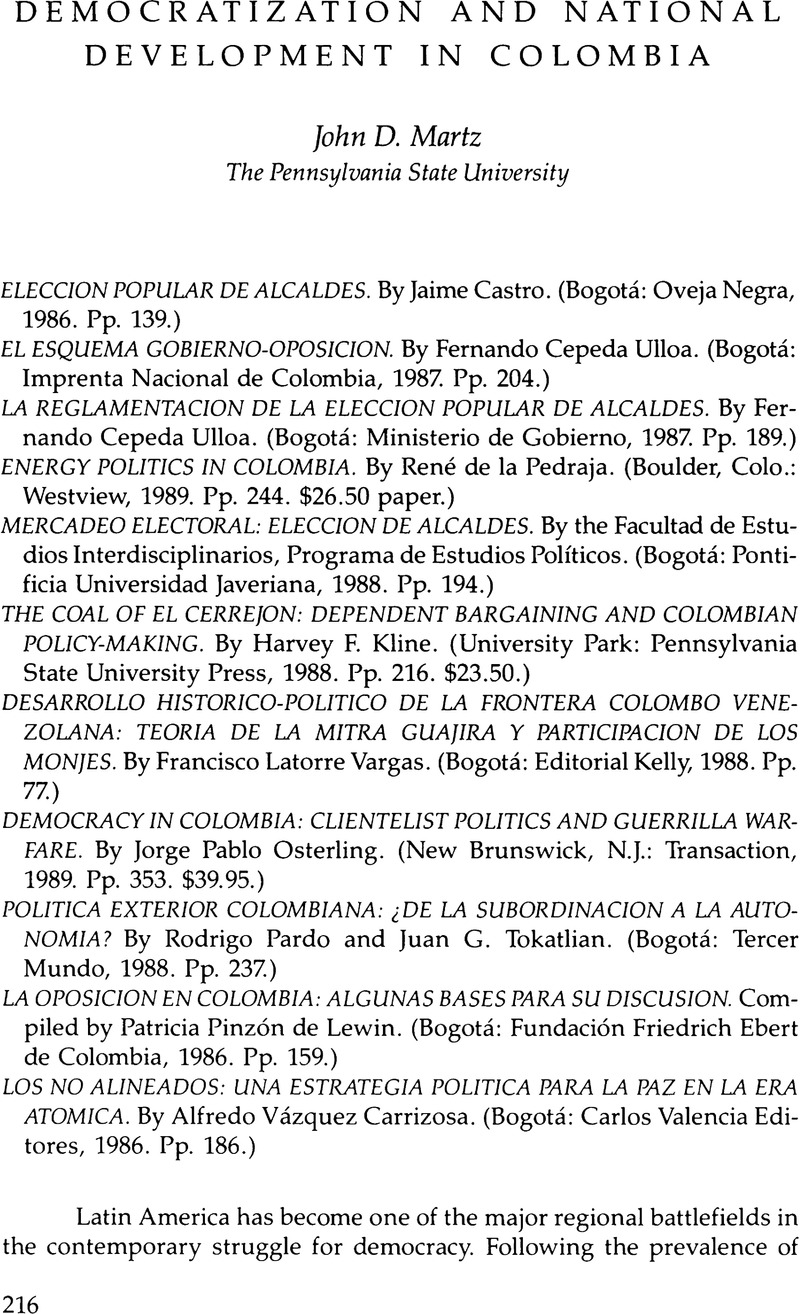Published online by Cambridge University Press: 12 October 2022

1. For an important source, see Democracy in the Americas: Stopping the Pendulum, edited by Robert A. Pastor (New York: Holmes and Meier, 1989).
2. See the interview with Belisario Betancur in Paul H. Boeker, Lost Illusions: Latin America's Struggle for Democracy as Recounted by Its Leaders (New York: Markus Wiener, 1990), 219–27.
3. The literature includes the usual official publications presenting Betancur's views during his term in office. Among other sources, see José Manuel Arias Carrizosa, Amnistía e indulto para la democracia (Bogotá: n.p., 1986); see also Comisión de Estudios sobre la Violencia, Colombia: violencia y democracia (Bogotá: Universidad Nacional de Colombia, 1987).
4. The legislative proposals debated in 1980 and 1981 are found in Alvaro Tirado Mejía, Descentralización y centralismo en Colombia (Bogotá: Oveja Negra and Fundación Friedrich Naumann, 1983).
5. Additional sources include Reformas políticas: apertura democrática, edited by Jaime Castro, edition prepared for Cristina de la Torre (Bogotá: Oveja Negra, 1985). An extended treatment of apertura can be found in Ricardo Santamaría S. and Gabriel Silva Luna, Proceso político en Colombia: del Frente Nacional a la apertura democrática (Bogotá: Editorial CERAC, 1984).
6. For a compilation of his views published shortly before the 1986 elections, see Virgilio Barco Vargas, Hacia una Colombia nueva (Bogotá: Oveja Negra, 1986).
7. Barco is quoted in Boeker, Lost Illusions, 198.
8. Among the most recent is the superb study by Francisco Leal and Andrés Dávila, Clientelismo: el sistema político y su expresión regional (Bogotá: Tercer Mundo, 1990).
9. For statements of my own views, see Martz, “Diplomacy and the Imposition of Values: Definitions and Diplomacy,” in Latin America, the United States, and the Inter-American System, edited by John D. Martz and Lars Schoultz (Boulder, Colo.: Westview, 1980), 145–73; and Martz, “Images, Intervention, and the Cause of Democracy,” in United States Policy in Latin America: A Quarter Century of Crisis and Challenge, 1961–1986, edited by John D. Martz (Lincoln: University of Nebraska Press, 1988), 307–31.
10. Alfredo Vázquez Carrizosa, Las relaciones de Colombia y Venezuela: la historia atormentada de dos naciones (Bogotá: Tercer Mundo, 1983). For further discussion of the Colombian-Venezuelan boundary dispute (accompanied by pertinent citations), see two articles in the Winter 1988–89 issue of Journal of Inter-American Studies and World Affairs: John D. Martz, “National Security and Politics: The Colombian-Venezuelan Border,” 117–39; and Larry N. George, “Realism and Internationalism in the Gulf of Venezuela,” 139–71.
11. Jonathan Hartlyn, The Politics of Coalition Rule in Colombia (Cambridge: Cambridge University Press, 1988). Having reviewed the book in another journal, I have excluded it from this essay.